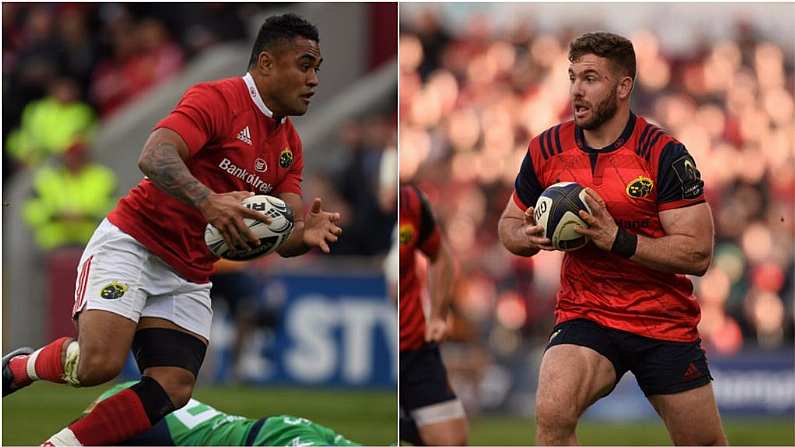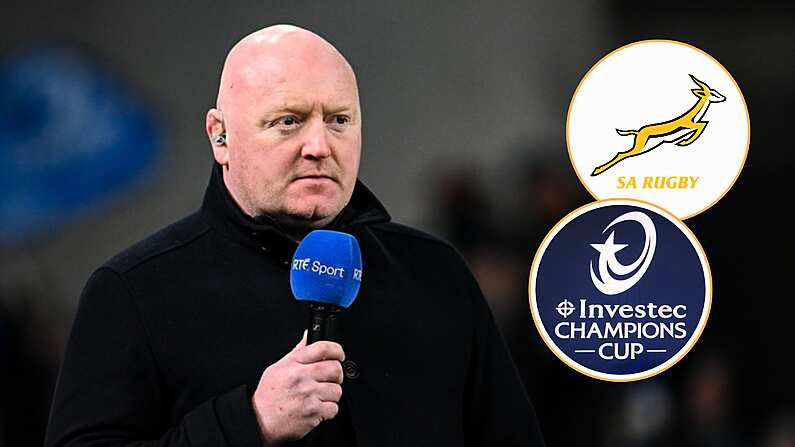A few eyebrows were raised down south yesterday when the departing Francis Saili was named at 13 in Rassie Erasmus' starting XV to face Ospreys in the PRO12 semi-final.
Jaco Taute was listed amongst the replacements for today's Thomond Park clash, not hours after it was confirmed by Munster that the Springbok - who was initially drafted in on loan as a replacement for the injured Saili - will remain at the province beyond this campaign having signed a contract extension.
Taute had been replaced in Munster's starting lineup by the man he's been entrusted to replace permanently; a curious manoeuvre by Erasmus, if nothing else.
Francis Saili starts ahead of Jaco Taute tomorrow. Munster as you would expect otherwise.
— Cian Tracey (@CianTracey1) May 19, 2017
Interesting that despite leaving, Saili is ahead of Taute for the semi-final. Saili is that something a bit different, think he'll be missed
— Jonathan (@JFitzpatrick92) May 19, 2017
With eight tries in his 24 Munster appearances to date, the 26-year-old former Stormers centre has more than fit the bill since All Black Saili was stricken down for four months by a shoulder injury last August. For the most part, Taute has embodied the age-old Munster mantra, his blood-and-thunder approach fast-tracking him to hero status in the Thomond stands.
Conversely, largely due to his physical ailments, Saili's progress in red has frequently been stunted, and despite impressive cameos and one-off standout performances, the former All Black has scarcely lived up to his two-year, €1m deal since arriving from Auckland in 2015.
And so on the face of it, given their respective seasons and the overall consensus that Taute has made more of an impact on Munster's backline than his Kiwi counterpart - and in a far shorter period of time - the decision to keep Taute seemed rather straightforward.
There probably isn't a single conjugation of Munster fans who haven't hypothesised as to the prudence of retaining Taute's services over Saili's this season, such has been the big Bok's impact. He's explosive in contact. He's a better defender. He gets it. Meanwhile, for all of Saili's more mercurial talents, the timing just hasn't been right for him to justify his club-highest €500,000-per-year salary - a sum which, for context, isn't far shy of what Johnny Sexton earns at Leinster.
But while the decision to retain the cheaper and thus-far more effective option in Taute strikes as relatively straightforward to most fans, it wasn't viewed as so by Erasmus or Munster themselves.
As per a number of key personalities within Munster Rugby, Saili starts over his long-term replacement today for the simple reason that he's currently in far superior form than Taute. The perception amongst Erasmus and others is that since his uncharacteristically meek display versus Saracens at the Aviva Stadium last month, Taute has played somewhat within himself - perhaps due to the fatigue of having played the majority of Munster's games since October.
Conversely, since fronting up as a leader alongside younger heads during a victory in Cardiff on March 4th, Saili - all the while aware that this would be his swansong in Munster red - has hit the ground running at long last, consistently terrorising defences as either a starter or impact substitute. And so rather than view their PRO12 semi-final as a means of building towards future campaigns, and starting Taute alongside Rory Scannell in the middle, Erasmus has picked what he considers his strongest XV at present.
In essence, Munster's decision not to renew Saili's contract and to instead retain Taute - with Ulsterman Chris Farrell adding to the competition for places next season - was largely financial, and not a simple case of 'Taute has been better' as it might have appeared to supporters for the majority of this campaign.
While Taute will doubtless go on to succeed in his new home, Saili departs the province as the form centre of the pair. Unfortunately, and through little fault of his own, perhaps, that form arrived too late to justify an extension to a stint which might best be considered a case of what might have been as opposed to what wasn't.










